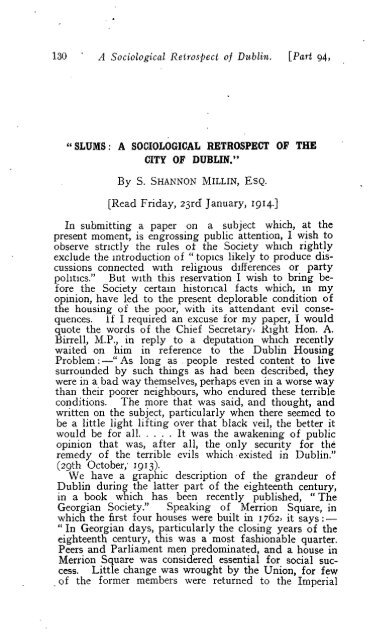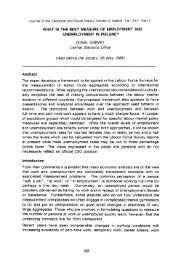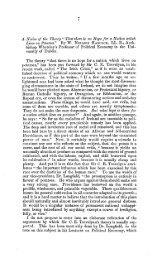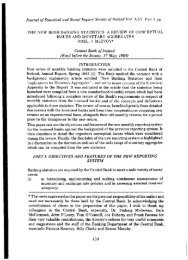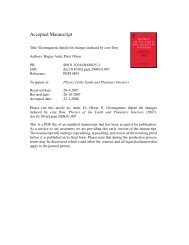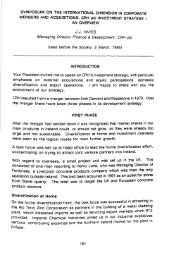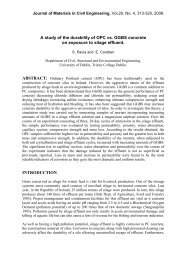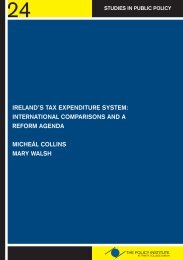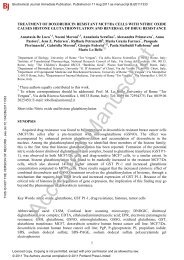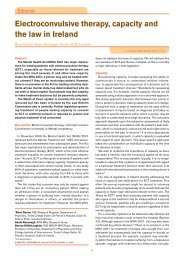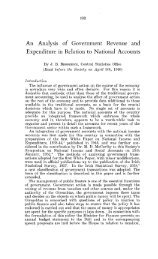Read Friday, 23rd January, 1914. - TARA - Trinity College Dublin
Read Friday, 23rd January, 1914. - TARA - Trinity College Dublin
Read Friday, 23rd January, 1914. - TARA - Trinity College Dublin
You also want an ePaper? Increase the reach of your titles
YUMPU automatically turns print PDFs into web optimized ePapers that Google loves.
130 ' A Sociological Retrospect of <strong>Dublin</strong>. [Part 94,<br />
"SLUMS: A SOCIOLOGICAL RETROSPECT OF THE<br />
CITY OF DUBLIN."<br />
By S. SHANNON MILLIN, ESQ.<br />
[<strong>Read</strong> <strong>Friday</strong>, <strong>23rd</strong> <strong>January</strong>, <strong>1914.</strong>]<br />
In submitting a paper on a subject which, at the<br />
present moment, is engrossing public attention, I wish to<br />
observe strictly the rules ot the Society which rightly<br />
exclude the introduction of " topics likely to produce discussions<br />
connected with religious differences or party<br />
politics." But with this reservation I wish to bring before<br />
the Society certain historical facts which, in my<br />
opinion, have led to the present deplorable condition of<br />
the housing of the poor, with its attendant evil consequences,<br />
if I required an excuse for my paper, I would<br />
quote the words of the Chief Secretary* Right Hon. A.<br />
Birrell, M.P., in reply to a deputation which recently<br />
waited on him in reference to the <strong>Dublin</strong> Housing<br />
Problem:—"As long as people rested content to live<br />
surrounded by such things as had been described, they<br />
were in a bad way themselves, perhaps even in a worse way<br />
than their poorer neighbours, who endured these terrible<br />
conditions. The more that was said, and thought, and<br />
written on the subject, particularly when there seemed to<br />
be a little light lifting over that black veil, the better it<br />
would be for all It was the awakening of public<br />
opinion that was, after all, the only security for the<br />
remedy of the terrible evils which existed in <strong>Dublin</strong>."<br />
(29th October; 1913).<br />
We have a graphic description of the grandeur of<br />
<strong>Dublin</strong> during the latter part of the eighteenth century,<br />
in a book which has been recently published, " The<br />
Georgian Society." Speaking of Merrion Square, in<br />
which the first four houses were built in 1762* it says : —<br />
" In Georgian days, particularly the closing years of the<br />
eighteenth century, this was a most fashionable quarter.<br />
Peers and Parliament men predominated, and a house in<br />
Merrion Square was considered essential for social success.<br />
Little change was wrought by the Union, for few<br />
of the former members were returned to the Imperial
<strong>1914.</strong>] By S. Shannon Millin, Esq. ' 131<br />
Parliament, partly owing to the reduced representation<br />
of Ireland, and partly because the increased cost precluded<br />
barristers, so numerous in the Irish House, and,<br />
in fact, all except the wealthier country gentlemen, from<br />
sitting at Westminster. . . . The aristocratic inhabitants<br />
used to make the square a fashionable promenade/'<br />
(Vol. IV., p. 69). -<br />
Here is another picture in the year 1900 by the Medical<br />
Officer ,of Health:—"<strong>Dublin</strong> is, in truth, a poor city><br />
and no street and square in it is distant 500 yards from<br />
a purlieu. . . . You cannot walk- 500 yards in <strong>Dublin</strong><br />
without coming to a place inhabited by the very lowest<br />
section of the. people. All round Merrion Square, all<br />
round Fitzwilliam Square there are purlieus."<br />
As the 'late Recorder of <strong>Dublin</strong>, Sir Frederick<br />
Falkiner, has truly said :—" The current history of <strong>Dublin</strong><br />
is a tale of two cities, a city of splendour and a city<br />
of squalor: diverse as the poles."<br />
(Transactions of National Association for the Promotion<br />
of Social Science, <strong>Dublin</strong>, 1881, p. 571).<br />
CENSUS OF IRELAND, 1911.<br />
According to the recent census figures (Cd. 6049-IL),<br />
the population of the city (or County Borough) of<br />
<strong>Dublin</strong> is 304,802. The land area (excluding 166<br />
acres of water) is 7,745 acres. Deducting from that<br />
acreage 1,314 acres under crop* 1,905 acres under grass,<br />
and 64 acres of plantations, we have 4,462 acres of<br />
houses, roads, streets, on which 304,802 people live, or<br />
68*3 persons per acre (Table I.).<br />
Sir Charles Cameron, in his Health Report for 1912*<br />
says there are 38*8 persons per acre in the city, but that<br />
calculation is based on the larger acreage.<br />
The number of houses is 35,477, or an average of 8'2<br />
persons per house; and the number of distinct families is<br />
62,365, or an average of 4*6 per family (Table 8).<br />
The Professional Class numbers 18,438; and the<br />
Domestic Class numbers 18,232.<br />
- The Medical Class numbers 2,358, or *JJ per cent, of<br />
the population, made up as follows : —Physician, surgeon,<br />
and general practitioner, 342; dentist, assistant^ 180;<br />
medical student, assistant, 470; subordinate medical assistant,<br />
849; midwife, 215; hospital certificated'nurse, 302.<br />
The Clerical Class numbers 1,784, or .58 per cent, of the<br />
population, made up as follows:—Clergy, 415; monks,<br />
157; nuns, 829; itinerant preachers, 46; theological stu-<br />
, dents, 265; others, 72.
132 " A Sociological Retrospect of <strong>Dublin</strong>. [Part 94,<br />
There are 85 principal public institutions in the city, with<br />
a population of 18,629, of which 15,533 w . ere special inmates,<br />
such as paupers, patients, lunatics, prisoners, leaving<br />
3,096 other than special inmates.<br />
City Boundary<br />
Extension by<br />
<strong>Dublin</strong> Corporation<br />
Act, 1900.<br />
1881<br />
1891.<br />
1901.<br />
1911.<br />
Population ..<br />
249,602<br />
245,001<br />
290,638<br />
304,802<br />
Acreage<br />
3,807<br />
3,733<br />
4,161<br />
" A."<br />
4,462<br />
" B."<br />
Density of Pop.<br />
per acre.<br />
65-5<br />
65-6<br />
69; 8<br />
68-3<br />
No. of Families<br />
54,725<br />
51,851<br />
59,263<br />
62,364<br />
No. of Houses<br />
Inhabited.<br />
24,211<br />
25,764<br />
32,061<br />
35,477<br />
No. of Houses<br />
Uninhabited.<br />
3,060<br />
3,448<br />
3J95<br />
i,934<br />
" A "—Not including 1,309 acres under crop.<br />
2,183 „ . grass.<br />
74 „ plantations.<br />
118 „ fallow.<br />
" B "—Not including 1,314 acres under crop.<br />
1,905 ,, grass.<br />
,, 64 ,, plantations.<br />
POOR LAWS.<br />
(1). "'An Act for erecting a workhouse in the City of<br />
1703. <strong>Dublin</strong> for employing and maintaining the<br />
poor thereof." 2 Anne, c. 19.<br />
The first direct provision for the relief of the poor was<br />
made in 1703 by the above Act, the preamble of which
<strong>1914.</strong>] By S. Shannon Millin, Esq. 133<br />
states "that the necessities, number, and continual increase<br />
of the poor within the City of <strong>Dublin</strong> and liberties<br />
thereto adjoining, are very great and exceedingly burdensome,<br />
for want of workhouses to set them to work, and a<br />
sufficient authority to compel thereto." A corporation to<br />
have perpetual succession was created, and called " The<br />
Governors and Guardians of the poor of the City of<br />
<strong>Dublin</strong>," with power " to apprehend all idle or poor people<br />
begging or seeking relief, or who receive parish alms within<br />
the county of the city or liberties thereto adjoining ....<br />
and also to detain and keep in the service of the said corporation<br />
until the age of sixteen years any poor child or<br />
children found or taken up within the said city or liberties<br />
above the age of five years," and to apprentice out such<br />
children to any honest persons, being Protestants, a male<br />
child under the age of 24 and a female child under the<br />
age of 21 (s. 4).<br />
Section 11 enacts "that all that the parcel of ground<br />
walled in on the south-west end of James's Street and a<br />
parcel of land adjoining thereto, called the pipes, containing<br />
about 14 acres, on which are built several houses<br />
called George's Folly, being the donation of the said city,<br />
for and towards the support of the said workhouse, shall<br />
be and is hereBy vested in the said governors and guardians<br />
of the poor of the said City of <strong>Dublin</strong>, and their<br />
successors for ever, for the use, support, and maintenance<br />
of the said poor to be employed in the said workhouse."<br />
On 24th June, 1710, the House of Commons " Resolved,<br />
nemine contradicente, that the strict and due execution of<br />
the several laws in force in this kingdom against sturdy<br />
beggars, and for confining the poor thereof to their respective<br />
parishes, would be a public and seasonable service to<br />
this kingdom." (Irish Com. Jour., Vol. III., p. 780).<br />
(2.) An Act (inter alia) "for establishing a regular<br />
1723. watch in the City of <strong>Dublin</strong>." 10 Geo. I.,<br />
Section 17 recites: " And whereas great number of idle<br />
and vagrant persons do daily resort from the country to<br />
the City of <strong>Dublin</strong> and suburbs thereof, who, by reason<br />
of the correspondence they generally keep with the beadles<br />
of the several parishes, and the neglect of such beadles<br />
in the performance of their duty, are permitted to beg<br />
in and throughout this city."<br />
The Lord Mayor was empowered to make rules for<br />
beadles to clear the city of beggars and inflict a fine of
134 A Sociological Retrospect of <strong>Dublin</strong>. [Part 94,<br />
ios., and, in default of payment and distress, to send<br />
them to house of correction for 48 hours.<br />
(3). '"An Act for the better regulating the Workhouse<br />
of the City of <strong>Dublin</strong>, and to regulate<br />
I 7 2 7- and provide for the poor thereof." 1 Geo.<br />
II.y C. 27.<br />
We see from the preamble of this Act, that 2 Anne, c. 19,<br />
"hath not answered the good end and design proposed<br />
thereby: but notwithstanding the said Act the city and<br />
liberties thereto adjoining are extremely burdened with<br />
great numbers of poor and idle vagrants, many of whom<br />
are able to work and earn their bread, if proper care were<br />
taken to regulate and employ them."<br />
The corporation was reconstituted, and called " The<br />
Governors of the Workhouse of the City of <strong>Dublin</strong> (s. 2),<br />
and their powers were extended to " full power and<br />
authority to seize and apprehend any sturdy beggar or<br />
beggars, or other idle vagabond or vagabonds . . . begging<br />
or strolling, or frequenting any of the streets or<br />
houses within the said city or suburbs of <strong>Dublin</strong> or the<br />
liberties adjoining," and any person so apprehended could<br />
be committed to the workhouse for any term not longer<br />
than four years with hard labour.<br />
" And be it further enacted by the authority aforesaid :<br />
That all and every poor child or children, found or taken<br />
up within the city or. liberties, which shall be left to be<br />
maintained by any parish or parishes in the said city or<br />
liberties aforesaid, who are unable to support themselves,<br />
shall, from and after the age of six years, be admitted<br />
and received into the said workhouse,^ and there be taught<br />
to read and write and thoroughly instructed in the principles<br />
of the Protestant religion of the Church of Ireland,<br />
as by law established." (s. 26).<br />
"And whereas the exposed or foundling children left<br />
yearly on the several parishes in the city and suburbs of<br />
<strong>Dublin</strong> are very numerous, and do mostly perish before<br />
they attain the age of six years for want of due care and<br />
provision for them: and it is manifest that neither the<br />
workhouse of the said city or the fund thereof is large<br />
enough for the reception or relief of such foundlings before<br />
they attain the age aforesaid: it is therefore enacted<br />
that overseers of the poor shall be elected for every parish<br />
in the city and liberties to take care of foundlings<br />
till admitted into the wprkhouse," s. 28. Section 20 provides<br />
" that a parish cess be made for their support."
1914J By S. 'Shannon Millin, Esq. 135<br />
(4). " An Act for the better enabling the Governors<br />
of the Workhouse of the City of <strong>Dublin</strong> to<br />
provide for and employ the poor therein, and<br />
1729. for the more effectual punishment of vagabonds<br />
: and also for the better securing of<br />
and providing for lunatics and foundling<br />
children." 3 Geo.II., c. 17.<br />
Section 6 enacts, " That from and after 25th March,<br />
1.730, the governors of the said workhouse shall receive<br />
from the church-wardens of the respective parishes of the<br />
said city and liberties adjoining all the exposed and<br />
foundling children that shall then be in the said city and<br />
liberties thereunto adjoining under the age of six years."<br />
(5). Section 2 recited : " That there are great numbers<br />
of loose idle vagrants, and of loose persons<br />
of infamous lives and characters in<br />
<strong>Dublin</strong>, and the County of <strong>Dublin</strong>," and it<br />
is enacted " that such persons may be presented<br />
by the Grand Juries of the Court of<br />
1735. King's Bench, or the Session of Oyer and<br />
Terminer and Gaol delivery, held in the<br />
King's Courts after term for the county, or<br />
City of <strong>Dublin</strong>, and sent on board His<br />
Majesty's fleet, or transported fox seven<br />
years." 9 Geo. II., c. 6.<br />
In 1737 Swift published " A Proposal for giving Badges<br />
to the Beggars in» all the Parishes of <strong>Dublin</strong>," and from it<br />
we gather that the House of Industry did not afford adequate<br />
relief for the poor. " The principal end I take to<br />
have been that of maintaining the poor and orphans of<br />
the city, where the parishes are not able to do it; and<br />
-clearing the streets from all strollers, foreigners and sturdy<br />
beggars, with which, to the universal complaint and<br />
admiration, <strong>Dublin</strong> is more infested since the establishment<br />
of the poorhouse, than it was ever known to be since<br />
its first erection."<br />
(6). " An Act to provide for begging children, and<br />
for the better regulation of Charity Schools,<br />
and for taking up vagrant and offensive beg-<br />
1749. gars in the City of <strong>Dublin</strong> and liberties<br />
thereof, and the liberties thereto adjoining."<br />
23 Geo. II., c, 11.<br />
The preamble recites : " Whereas there are in almost<br />
every part of the Kingdom great numbers of helpless
136 A Sociological Retrospect of <strong>Dublin</strong>. [Part 94,<br />
children who are forced to beg, and who will in all likelihood,<br />
if some proper care be not taken of their education,<br />
become hereafter not only unprofitable but dangerous to<br />
their country."<br />
"And whereas several strolling beggars and vagrants,<br />
labouring under various disorders which render them not<br />
only offensive to the sight, but also dangerous to the<br />
health of many of the inhabitants of the City of <strong>Dublin</strong>,<br />
do daily resort from different parts of this kingdom to<br />
beg alms in the public streets and liberties of the said city<br />
to the great annoyance of the inhabitants thereof, by exposing<br />
their infirmities in order to move compassion. And<br />
whereas the Court of Assistants of the Governors of the<br />
Workhouse of the said city, or any one or more of them,<br />
are empowered in and by an Act (3 Geo. II., c. 17) to commit<br />
all such beggars and vagrants to the said workhouse;<br />
but the said workhouse, not being capable of containing^pr<br />
accommodating the great numbers of such beggars and<br />
vagrants who resort to the said city, several of the Governors^<br />
of the said Workhouse, with others charitably<br />
inclined, have erected an almshouse in the said city, called<br />
the Hospital for Incurables, where several such miserable<br />
objects are attended by physicians and surgeons and provided<br />
with all necessaries " (s. 10).<br />
In 1768 Dr. Richard Woodward, then Dean of Clogher,<br />
published " An Argument of the Right of the Poor in this<br />
Kingdom to a National Provision," in which he lays down<br />
three propositions : " (1) That the poor are so inadequately<br />
provided for by voluntary contributions in this kingdom<br />
as to stand in need of some legal title'to a maintenance.<br />
(2) That it is the indispensable duty of the rich to provide<br />
a competent maintenance for the poor. (3) That it is<br />
eminently for the interests of the commonwealth that this<br />
duty be discharged in an ample and effectual manner."<br />
Strange as it may appear, this was the first proposal for a<br />
national provision for the Irish poor, although it had been<br />
the birthright of the English poor for 167 years.<br />
(7). " An Act for better regulating the Foundling<br />
Hospital and Workhouse in the City of<br />
1772. <strong>Dublin</strong>, and increasing the Fund for the<br />
support thereof." 11-12 Geo. ///., c. 11.<br />
This Act repeals all previous Acts, and creates a Corporation,<br />
with a common seal, " to be called the Governors<br />
of the Foundling Hospital and Workhouse of the City of<br />
<strong>Dublin</strong> " (s. 4). It further enacts : " Whereas the recep-<br />
„ tion of vagabonds and strolling beggars into the same
1914J By S. Shannon Millin, Esq. 137<br />
house or ^ within the same "walls with children will be<br />
manifestly injurious by the setting a bad example<br />
Be it enacted that, after 24th June, 1772, no vagabond.or<br />
strolling'beggar shall be sent into the same house, or kept<br />
within the same walls with the children hereby intended<br />
to be provided for" (s. 13).<br />
(8). " An Act for Badging such poor as shall be<br />
found unable to support themselves by<br />
labour, and otherwise providing for them,<br />
1772. and for restraining such as shall be found<br />
unable to support themselves by labour or<br />
industry from begging." 11-12 Geo. III.,<br />
c. 30.<br />
Preamble:—"Whereas strolling beggars are very<br />
numerous in this kingdom: And whereas it is become<br />
equally necessary to give countenance and assistance to<br />
those poor who shall be found disabled by old age or<br />
infirmities to earn their living, as to restrain and punish<br />
those who may be able to support themselves by labour<br />
or industry, and yet may choose to live in idleness by<br />
begging: and it is just to call upon the humane and<br />
affluent to contribute to support of real objects of<br />
charity."<br />
Section 5 requires the corporations created by the Act<br />
" to build hospitals, to be called Workhouses or Houses<br />
of Industry, as plain, as durable, and at as moderate expense<br />
as possible."<br />
' Speaking of this Act, the Royal Commission of 1833-<br />
1836 says in the First Report:—"There is more truth,<br />
more common sense; there are more sound views of<br />
political economy in this title; in this preamble, than in all<br />
the previous Acts of the Irish Legislature put together.<br />
Had the same wisdom directed them in carrying out the<br />
details of their measure for remedying the grievances<br />
which demanded redress, as is to be found in the drawing<br />
of the above outline, and had their patriotic exertions-been<br />
aided by the Parliament of England, Ireland might now<br />
be looked upon as a model of good government and happiness<br />
by those to whom she is only known by her /misfortunes<br />
and crimes."<br />
One of the principal founders of the House of Industry<br />
was Rev. Dr. Woodward, to whom I have already referred.<br />
Born in England, he owed his appointment in Ireland, to<br />
that system of patronage, .the abuses of which were<br />
"probably unparalleled in Europe" (Lecky, " Ireland in<br />
the Eighteenth Century," VoL I,/p. 204). Woodward,<br />
however, was an exception/ and always evinced the* most
13S A Sociological Retrospect of <strong>Dublin</strong>. [Part 94,<br />
enlightened regard for the welfare of the poor, irrespective,<br />
of their professed religion, in the land of his adoption.<br />
He was ordained Dean of Clogher in 1764; Chancellor of<br />
St. Patrick's in 1772, and was consecrated Bishop of<br />
Cloyne in 1781. One of the provisions which he laid<br />
down in 1768, viz., "the indispensable duty of the rich to<br />
provide a competent maintenance for the poor," was embodied<br />
in the preamble of 11-12 Geo. III., c. 30, viz.:<br />
" It is just to call upon the humane and affluent to contribute<br />
to support of real.objects of charity." In 1775 he<br />
published " An Address to the Public on the expediency<br />
of a Regular Plan for the Maintenance and Government<br />
of the Poor," in which he states that one of the immediate<br />
effects of the suppression of begging in <strong>Dublin</strong> was the<br />
failure of many of the low retailers of spirituous liquors.<br />
He also estimates that the gross number of beggars infesting<br />
the streets of <strong>Dublin</strong> was 2,000, and that their<br />
gains from begging amounted to £31,200 per annum.<br />
In 1782 he strenuously advocated in the Irish House of<br />
Lords, to which he had just been elevated, the entire repeal<br />
of the Penal Laws against the Roman Catholics<br />
In the following year, 1773, the House of Industry was<br />
established in <strong>Dublin</strong>, and, as will be seen from the above<br />
preamble, the Irish Legislature looked to voluntary effort<br />
for its support, and so did not make compulsory provision<br />
for relief. The voluntary contributions proved to be<br />
entirely insufficient, and Parliament was obliged in 1777<br />
to vote a grant of £4,000 towards its support, and from<br />
that period annual grants were voted. The original object<br />
of^ the House of Industry was the suppression of mendicity<br />
in <strong>Dublin</strong>, but as applicants were, from a very early<br />
period, admitted indiscriminately, it became a national<br />
rather than a local institution, and may be regarded as the<br />
Poor House for the greater part of Ireland. Two wards<br />
were opened in 1774 for the accommodation of medical<br />
and surgical patients, under the care of two physicians<br />
and two surgeons. In the year 1790 the Corporation for<br />
the Relief of the Poor elected a third physician and a<br />
third surgeon, and also a consulting physician and surgeon.<br />
As a corrective to the increasing cost of the institution,<br />
the dietary was reduced to 1800. This, however, did<br />
not accomplish the desired object, and in 1816 it was<br />
appropriated to (1) infirm and aged; (2) sick labouring<br />
under acute or chronic diseases;, (3) orphan children; (4)<br />
idiots and lunatics. It thus became a great hospital for<br />
the reception of such paupers as came within the abovementioned<br />
classes.<br />
The history of the Foundling Hospital is so remarkable<br />
that I.must point out some of the principal stages in its
.<strong>1914.</strong>] By S. Shannon Millin, Esq. '- 139<br />
development. When, the workhoiise was, erected' in <strong>Dublin</strong><br />
in 1704, no child under the age of five could be admitted.<br />
In the Act of 1729' (3 Geo. II., c. 17), children could be<br />
admitted into the workhouse, irrespective of age, and in<br />
the following year " a cradle or turning wheel" was provided<br />
at the gate, so that infants could be taken in at any<br />
time, without inquiries being, made. (" A Brief History<br />
of the Ancient Foundling Hospital of <strong>Dublin</strong>," by W. M.<br />
Wodsworth). In 1772 the children were separated from<br />
the vagabonds and strolling beggars, whose bad example<br />
might be injurious to the children. In 1773' (13-14 Geo.<br />
III., c. 17) it was enacted that no child above 3 years was<br />
to be admitted into the hospital (s. 1). In 1775 (15-16<br />
Geo. III., c. 25), the age was limited to 12 months (s. 1).<br />
Henceforward the old workhouse, which now forms portion<br />
of the South <strong>Dublin</strong> Union in James's Street, became<br />
purely and simply a Foundling Hospital, and the children<br />
were badged with a seal, representing a female, with a<br />
distaff, "Industry/ 1 and the motto, "The diligent hand<br />
maketh rich."<br />
As I have already stated, the Foundling Hospital, was<br />
established, in 1772, with the avowed object of separating<br />
the children, from vagabonds and strolling begg^ wHdpe<br />
toad example might be injurious to the children/ 'Tne
140 A Sociological Retrospect of, <strong>Dublin</strong>. [Part 94,.<br />
development of that institution may be summarised in the<br />
words of the Royal Commission on the Poor Laws.<br />
(Report on Ireland, Cd. 4630).<br />
" The <strong>Dublin</strong> Foundling Hospital gradually became<br />
one of the most gigantic baby-farming, nursing, boardingout,<br />
and apprenticing institutions that these countries<br />
have ever seen. The objects of the institution were<br />
avowedly two-fold : firstly, to prevent the ' exposure,<br />
death, and actual murder of illegitimate children'; and<br />
secondly, to educate and rear children taken in charge of<br />
the institution ' in the Reformed or Protestant Faith, and<br />
thereby strengthen and promote the Protestant interest in<br />
Ireland/ Both these objects were, however, more or less<br />
frustrated by the operation of natural causes." Par. 274.<br />
" The mismanagement of the Foundling Hospital became<br />
so notorious that a Committee of the House of Commons<br />
inquired into the matter on oath in 1797. It appears<br />
from their Report that, out of 12,768 children admitted in<br />
the six years ended 24th June, 1796, 9,786 had died; and<br />
2,847 were unaccounted for. The management was<br />
'reformed* under a new Act of Parliament in 1798."<br />
Par. 275.<br />
A Select Committee on the Irish Miscellaneous Estimates,<br />
in a Report dated 19th June, 1829, recommended<br />
that, from and after 1st <strong>January</strong>, 1830, all further admissions<br />
to the Foundling Hospital should cease. The total<br />
Parliamentary grants during the, thirty years ended 31st<br />
December, 1829, amounted to ^"787,682, or an average<br />
annual grant of over £26,000.<br />
It is impossible to conceive a more scathing commentary<br />
on the prostitution of charity than that which the histor-y<br />
of the Foundling Hospital reveals. The "management"<br />
seems to have acted in strict accordance ,with the motto<br />
which was inscribed on the Seal of the Institution, It recalls<br />
Swift's statement:<br />
"Yet I confess I have known an hospital where all the<br />
household officers,grew rich, while the poor, for whose sake<br />
it was bui.lt, ^/Bt^ almast starving for want of food and<br />
raiment" (" A Short "\ftew of the'State of Ireland," 1727).<br />
" The training up and educating poor children as Protestants,<br />
and the repression of vagabondism, appear to be<br />
the objects chiefly so'ught to be attained-by all these Acts<br />
of the Irish Parliament: andjb these objects the relief of<br />
the infirm and destitute podr seem to be,regarded as a<br />
matter altogether secondary and subordinate." (Nicholls'<br />
" History of the Irish Poor Laws," p. 50).<br />
In 1804 a select committee of the House of Commons<br />
reported:—" That the adoption of a general system of<br />
provision for the poor of Ireland, by way of parish rate,
1914J &}' 5. Shannon Millin, Esq. 141<br />
^s in Englapd, or in any similar manner, would be highly<br />
injurious to the country, and would not produce any real<br />
or permanent advantage, even to the lower classes of people<br />
who must be the objects of such support."<br />
A . Royal Commission—composed of men intimately<br />
acquainted with -the Irish people, and having as their<br />
Chairman, Archbishop Whately—denounced the English<br />
system of,poor relief as unsuited to Ireland, after a close<br />
investigation of the question extending from 1833^0 1836.<br />
When the Poor Relief (Ireland) Bill was before the House<br />
of Commons in 1838, eighty-six petitions, with 31,221 signatures,<br />
were presented against the bill, and four petitions,<br />
with 593 signatures, in favour of it. Every Grand Jury in<br />
Ireland, with one exception, had petitioned against it.<br />
Daniel O'Connell and Lord Castlereagh, for the first time,<br />
coincided in their views, and fought side by side in the<br />
House of Commons in opposing the bill. At a meeting in<br />
Belfast, presided over by Rev. Dr. Cooke, three cheers were<br />
given for O'Connell, who was present, and spoke against<br />
the bill (see Report .of Vice-Regal Commission on Poor<br />
Law in Ireland, Cd. 3202, p. 12). Yet, in spite of the<br />
•overwhelming expression of Irish opinion, the workhouse<br />
system, based and modelled upon the English system, was<br />
established in Ireland by the Poor Relief (Ireland) Act,<br />
1838 (1 & 2 Vic, c. 56), which received the Royal Assent<br />
on 31st July, 1838.<br />
On the passing of 1-2 Vic, c. 56, that portion of the<br />
House of Industry which comprised the asylum for the<br />
aged and infirm and the asylum for the lunatics, was<br />
appropriated by the Poor Law Commissioners as the Workhouse<br />
of the North <strong>Dublin</strong> Union, and opened for the<br />
xlesjtitute poor on 25th March, 1840. The Hospitals (viz.,<br />
theJHardwicke Fever, erected in 1803; the Richmond Surgical,<br />
erected in 1811; and the Whitworth Medical, erected<br />
in 1818), were under the control of the Poor Law Commissioners,<br />
though supported by moneys voted by Parliament,<br />
under the' direct management of a* paid governor<br />
appointed by the Lord Lieutenant. . Out of a Parliamentary<br />
grant to this institution of £11,859 per-annum, tlie<br />
sum of £7,600 was expended on the three hospitals, and<br />
£4,259 on the workhouse.<br />
' : ; ., HOUSING OF THE POOR. '<br />
The problem of housing the poor in the City of <strong>Dublin</strong><br />
is by no means a question of recent years, and, for the<br />
origin of the present deplorable conditions, we iiiust look<br />
de,eper than "the character and "conduct of the <strong>Dublin</strong>
142 A Sociological Retrospect of <strong>Dublin</strong>. [Part 94,<br />
Corporation as at present constituted. 1 ' For more<br />
century the dwellings of.the poor have been far from-satis-*<br />
factory, and at a time when the Established Church was<br />
in full possession and enjoyment of its State emoluments,<br />
the lanes and alleys surrounding its numerous churches in<br />
<strong>Dublin</strong> were a living lie to the fundamental principles of<br />
Christianity.<br />
I would ask your particular attention to the following<br />
picture of <strong>Dublin</strong> towards the end of the eighteenth century<br />
: —<br />
In 1805 Rev. James Whitelaw, Vicar of St. Catherine's,<br />
published " An Essay on the Population of <strong>Dublin</strong>, being<br />
the result of an Actual Survey taken in 1798." At page 50<br />
he says: " In the ancient parts of the city the streets are,<br />
with few exceptions generally narrow, the houses crowded<br />
together, and the reres or back yards of very small extent.<br />
... A single apartment in one of these truly wretched<br />
habitations rates from is. to 2s. per week; and to lighten<br />
this rent, two, three, and even four families become joint<br />
tenants. As I was usually out at very early hours of the<br />
survey, I have frequently surprised from ten to sixteen<br />
persons, of all ages and sexes, in a room not fifteen feet<br />
square, stretched on a wad of filthy straw, swarming with<br />
vermin, and without any covering, save the wretched rags<br />
that constituted their wearing apparel. Under such circumstances,<br />
it is not extraordinary /that I should have<br />
frequently found from 30 to 50 individuals in a house.<br />
.... This crowded population, wherever it obtains, is<br />
almost universally accompanied by a very serious evil—<br />
a degree of filth and stench inconceivable except by such<br />
as.have visited these scenes of wretchedness. ... In the<br />
garret I found the entire family of a poor working shoemaker,<br />
seven in number, lying in a fever, without a human<br />
being to administer to their wants. ... I counted in this<br />
sty 37 persons, and computed that its humane proprietor<br />
received out of an absolute ruin, which should be taken<br />
down by the magistrate as a public nuisance, a profit rent<br />
of above £30 per annum, with unfeeling severity. ... I<br />
am certain that every friend to decencv and cleanliness,<br />
every person who is anxious to promote the comforts of the<br />
poor, will join in my opinion that a police which attends<br />
to our streets and lanes only, and that but partially, while<br />
it never bestows a thought on the back yards of the poor,<br />
performs only one half its duty; the more essential part,<br />
perhaps, is neglected. ... In July, 1798, the entire side<br />
of a nouse, four stories high, in. Schoolhouse Lane, fell<br />
from its .foundations into, an adjoining yard, where it<br />
destroyed an entire dairy of cows. I ascended the remaining<br />
ruin through the usual approach of shattered
LG.I4-] By S. Shannon Millin, Esq. 143'<br />
siairs, stench, 'and-filtH., • The flox^r had all sunk oa the<br />
side now unsupported, foripin;g : so many inclined, planes;<br />
and I observed,, with astonishment^ tha| the inhabitants,<br />
above 30 in number, who had escapee! destruction from the<br />
circumstances of the wall falling outwards, had not deserted<br />
their apartments; I was informed that it had<br />
remained some months in this situation, and that the<br />
humane landlord claimed, and actually received, for it<br />
the usual rent."<br />
We sometimes have a comparison drawn between <strong>Dublin</strong><br />
and Belfast as to their relative proportion of pauperism,<br />
and the conditions under which the poor are housed in the<br />
two cities. But the consideration of this question has,<br />
unfortunately, become so intermingled with religious prejudices<br />
and political feelings that the most monstrous and<br />
absurd theories are often advariced. In order to draw an<br />
impartial comparison we must not overlook the past history<br />
of the two cities. At the close of the 18th century, <strong>Dublin</strong><br />
was one of the largest and most populous cities in the<br />
United Kingdom; while Belfast had a population of 18,320<br />
in 1791. Immediately after the. Act of Union, <strong>Dublin</strong><br />
ceased to be a metropolis for the wealthy, but it continued<br />
to be a metropolis as regards the poor, and, to a very<br />
large extent, it has remained so^since. According to the<br />
First Annual Report of Commissioners of Irish Poor<br />
Laws, dated 1st May, 1848 : " The number of persons who<br />
received gratuitous rations (under Temporary Relief Act)<br />
on 4th July, 1847, is shown by the returns to have been in<br />
North <strong>Dublin</strong> Union, 27,734, and in South <strong>Dublin</strong> Union,<br />
?9>775 y and trie proportion of these persons classed as<br />
able-bodied amounted, together with their families, in<br />
North <strong>Dublin</strong> Union to 21,466, and in South <strong>Dublin</strong> Union<br />
to 24,966 " (p. 5). - -<br />
<strong>Dublin</strong> resembles very much the elder brother whose<br />
inheritance is encumbered estates—the result of past profligacy,<br />
corruption, and extravagance—which are not sufficient<br />
to keep up the family dignity.; Belfast, on the other<br />
hand, resembles the younger brother, whose inheritance is<br />
somewhat similar to that which is said to be the Kerryman's<br />
fortune, viz., a map of the world, and a kick from<br />
behind.<br />
Coming down to more recent years, Mr. Nugent Robinson,<br />
City Hall, <strong>Dublin</strong>,, says, in 1861 : " The dwellings of<br />
the poor in <strong>Dublin</strong> may be justly termed a ' disgrace to<br />
modern civilization/ .... These places are like so many<br />
hotbeds, from whence all diseases are transplanted into<br />
our hospitals. The number
144 A Sociological Retrospect of <strong>Dublin</strong>. [Part 94,<br />
of houses in the entire city. As the large majority of these:<br />
are overcrowded, we may safely venture upon the average^<br />
of eight persons to each house, which gives, us 64,600<br />
people out of a population of 249,733—50,000, at least, of<br />
whom reside in a fetid and poisonous atmosphere. The<br />
dwellings of the poor are chiefly confined to about 450<br />
lanes, courts, and alleys, and about 60 streets. I have<br />
taken. 134 of the worst streets and alleys, and the following<br />
are the results, as near as I could gauge them. In<br />
these 134 streets there are 2,102 houses occupied by roomkeepers;<br />
11,214 rooms; 14,850 beds, including wads of<br />
straw, and 40,319 persons."<br />
" There is a class of people in this city called ' housejobbers/<br />
To this community the. wretchedness of the<br />
dwellings of our poor is mainly owing. They buy up dilapidated<br />
houses and re-let them, either by the house or by<br />
the room. As a general rule, the ' jobber' remains behind<br />
the scenes, while the actor is some low brutish agent employed<br />
on commission to collect the rents by hook or by<br />
crook. The/jobbers 1 are utterly averse to ameliorating<br />
the condition of their tenants when anything in the shape<br />
of expense is liable to be incurred. It is to be regretted<br />
that many men of social position belong to this class."<br />
{Transactions of the National Association for the Promotion<br />
of Social Science, 1861).<br />
Mr. Henry J. P. MacLean, Chairman of the Public<br />
Health Committee of the Corporation of <strong>Dublin</strong>, estimated<br />
that in 1867 there were 9,000 tenements in <strong>Dublin</strong>, let at<br />
weekly rents not exceeding 3s., in which ^resided 27,000<br />
families, or more than one-third of the population. He<br />
says:—"There are in <strong>Dublin</strong> 1,295 houses occupied by<br />
3,258 families, without space whereon to construct any<br />
sanitary conveniences : that of these 635 houses (occupied<br />
by 1,598 families) are wholly unprovided with any sanitary<br />
accommodation; and that 660 houses, occupied by 1,670<br />
families," are but jointly provided with such accommodation,<br />
which does not, however, stand upon their own<br />
premises." (Transactions of the National Association for<br />
the Promotion of Social Science, 1867).<br />
In 1879 a Royal Commission was appointed, consisting<br />
of Sir Robert Rawlinson and Sir Francis MacCabe, " to<br />
inquire into the system of sewerage and drainage in the<br />
City of <strong>Dublin</strong>, in so far as suctr sewerage and drainage<br />
affected the sanitary condition of the city, and the state<br />
of the river Liffey flowing therein, and also to inquire<br />
whether such system was directly or indirectly prejudicial<br />
to the public health,"
1914J By S. Shannon Millin, Esq. 145<br />
..The.Report (C. 4 26(35), which, was published, in June,<br />
1880, contains, the following interesting facts: —<br />
" The City of <strong>Dublin</strong>, in 1879, contained 23,830. houses;<br />
of these, 9,760, were occupied as dwellings let in tenements,<br />
and it appears from the evidence of the executive sanitary<br />
officer, that of houses of this description occupied by more<br />
than one family, 2,300, containing an, estimated population<br />
of 30,000 persons, are in a condition which, renders them<br />
unfit for human habitation, and some are not worth, the<br />
expenditure which would be necessary in order to place<br />
them in a proper state, and to provide the requisite sanitary<br />
appliances " (p. 20). ,<br />
" Under existing conditions it frequently happens that<br />
each room is occupied by a,family, and, as far as can be<br />
ascertained, it would appear that about 117,000 of the<br />
population of <strong>Dublin</strong> are thus lodged. The average<br />
number of persons in each tenement house is stated to be<br />
from 10 to 12, but this number is frequently exceeded, so<br />
that excessive overcrowding is the rule. The occupants<br />
have to resort to one ashpit, placed in a yard, and, if there<br />
is a privy, it is utterly unfit for use,"<br />
" Amongst the several sanitary defects of the City of<br />
<strong>Dublin</strong>, the condition of the tenement houses is, perhaps,<br />
the most pressing, and is certainly the most difficult to be<br />
dealt with" (p. 21).<br />
"There are said to be about 1,100 tenement houses<br />
owned by five persons, who are not absentees, but who<br />
reside in the district for the^purpose of receiving the rents.<br />
If these 1,100 tenement houses only yield £$ per annum<br />
each, there will be £5,500 per annum for these five owners,<br />
or at a rate of about £1,100 each. The great blot in<br />
<strong>Dublin</strong>, all admit, is caused by these tenement houses, and<br />
the peculiarity is that they are not confined to narrow<br />
streets and poor localities, but are to be found in all parts<br />
of the city."<br />
" The history of a modern tenement house fully told<br />
might be as interesting as a passage in a novel, and its<br />
gradual degradation shown to be as terrible as a<br />
tragedy."<br />
" The degradation of houses is, it is now clearly shown,<br />
at the root of most of the excess of disease to be found in<br />
<strong>Dublin</strong>. It is not defective sewering, defective paving, defective<br />
street scavenging, or in the polluted state of the<br />
river Liffey, so much as in these horrible room tenements,<br />
which exist to the direct injury of more than 100,000 of<br />
the poor inhabitants, and at the indirect charge and direct<br />
money loss of the entire community. The poor people<br />
who overcrowd these tenements, and pay the pittance of<br />
6d. or is. 6d. per week for their room, buy misery very<br />
dearly, in loss of wages through sickness and suffering."
14:6 A Sociological Retrospect of <strong>Dublin</strong>. [Part 94,<br />
" The room tenements of <strong>Dublin</strong>, being the great sanitary<br />
sore of the city, we say that, until these places of<br />
residence are improved in some practicable and effective<br />
manner, there will be no hope or prospect of bringing the<br />
death-rate of <strong>Dublin</strong> to a moderate standard " (p. 22).<br />
"The seats of the greatest amount of disease are to be<br />
found in the tenement houses and their surroundings."<br />
" The last class of tenement houses comprises those described<br />
by the executive sanitary officer in his evidence as<br />
totally unfit for human habitation, and intrinsically not<br />
worth the cost of improvement. With regard to these, the<br />
duty of the Sanitary Authority is clear—the decision to<br />
close such houses admits principle of no hesitation " (p. 23).<br />
" We have come to the following conclusions : —<br />
" That the tenement houses of <strong>Dublin</strong>, according to the<br />
medical evidence so voluminously tendered at our inquiry,<br />
and embodied in this our Report, appear to be the prime<br />
source and cause of the excessively high death-rate. That<br />
they are not properly classified, registered, and regulated;<br />
that they are dilapidated, dirty ill-ventilated, much overcrowded,<br />
and that disease, a craving for stimulants and its<br />
consequences—drunkenness and extreme poverty—are<br />
thereby fostered, and that, until the condition of these<br />
houses shall have been improved, the general health of the<br />
city will continue to be injuriously affected."<br />
" That most of the courts and yards in connection with<br />
tenement houses are unformed and unpaved, and that, as<br />
a consequence, there is an accumulation of offensive dirt,<br />
general discomfort, loss of health, and loss of power to<br />
earn wages " (p. 29).<br />
" We further recommend that the entire scavenging of<br />
<strong>Dublin</strong>, both public and domestic, be undertaken, and carried<br />
out by the Corporation " (p. 31).<br />
In 1885 a Royal Commission, appointed to inquire into<br />
the Housing of the Working Classes, issued their Third<br />
Report (C. 4547), which deals with Ireland, and contains<br />
the following :— •<br />
" Notwithstanding the energetic action of the corporation<br />
and of private persons and of societies, the condition of<br />
things in <strong>Dublin</strong> is very far from satisfactory. It is said<br />
that the great improvement which has taken place in some<br />
uarters is counterbalanced by the deterioration which is<br />
? ound in Other districts. The evil of tenement houses<br />
exists very extensively in <strong>Dublin</strong> " (p. 6).<br />
Statistics show no sensible .diminuation of-the general
<strong>1914.</strong>] By S. Shannon Millin, Esq. U?<br />
death-rate. • Sir Charles Cameron accounts for this by the<br />
general poverty of the people and their badly-fed condition,<br />
which is well described in the words of a memorandum<br />
by Mr. Wodswoxth, Secretary to the Local Government<br />
Board, in which he says : —"It is a mistake, however,<br />
to conclude that the high death-rate in towns is attributable<br />
solely to the dwellings of the poor classes. It is due<br />
to other causes also. . It is mainly attributable to the<br />
deteriorated constitutions of the population, a deterioration<br />
.which is the result of inferior .and insufficient food,<br />
poor clothing, and misery generally for generations, resulting<br />
in sickly, feeble, and strumous.conditions of body,<br />
rendering the,poor people obnoxious (to use a medical<br />
word) to disease, and unable successfully to resist its inroads,<br />
and consequences. Sir Charles Cameron says ther€i<br />
is no.t a more under-fed population in the United Kingdom<br />
than the working-classes of <strong>Dublin</strong> " (p. 7).<br />
That the state of things is still far from satisfactory is<br />
shown by the fact that the death-rate of <strong>Dublin</strong> is still<br />
high, and is riot decreasing.<br />
" Overcrowding undoubtedly does exist to a very great<br />
extent in <strong>Dublin</strong>, as may be gathered from the following<br />
figures : 32,000 families out of the total of 54,000 residing<br />
in <strong>Dublin</strong> inhabit 7,200 houses out of a total of 24,000.<br />
No matter what the size of a room is, there is no doubt but<br />
that it is in the highest degree unhealthy for half-a-dozen<br />
persons to perform all the functions of life in the same<br />
apartment, as is frequently the case in <strong>Dublin</strong> " (p. 7).<br />
In February, 1900, the Local Government Board of Ireland,<br />
acting under the provision of Section 209 of the<br />
Public Health (Ireland) Act, 1878, appointed a Committee,<br />
consisting of Charles P. Cotton, Esq., the Board's Chief<br />
Engineering Inspector (Chairman), Right Hon. Joseph M.<br />
Meade, Sir John William Moore, R. L. Swan, Esq.,<br />
F.R.C.S.; Dr. Theodore Thompson, Medical Inspector,<br />
L.G.B., England; and Alderman P. Dowd,<br />
" to inquire and report to them as to (1) the cause ot<br />
the high death-rate in <strong>Dublin</strong>, and (2) the<br />
measures which, in their opinion, should be<br />
* adopted with the view of improving the health of<br />
the city."<br />
The Report (Cd. 243) was presented on 14th May, 1900,<br />
and contains the following: —<br />
" The average density of the population in <strong>Dublin</strong>, as<br />
ascertained by dividing the-population (according.to the<br />
Census Return of 1891) by the number of statute acres
148' A Sociological Retrospect of <strong>Dublin</strong>. [Part ,94,<br />
appears to be 65.6 per acre. The Registrar-General stated<br />
-that he found this to vary in the eight registration districts<br />
from 46.2 persons per acre to 124.4 peisonb per acre. These<br />
-figures cannot be relied on to any great degree of exactitude"'(p.<br />
7).<br />
- " The facts which came to the knowledge of the Committee<br />
clearly establish the existence in <strong>Dublin</strong>, in an<br />
exceptional degree, of several conditions which^are wont to<br />
be associated with a high rate of mortality. Especially<br />
noteworthy among these are the insanitary circumstances<br />
in which a considerable proportion of the population of<br />
<strong>Dublin</strong> lives. It has to be borne in mind that the proportional<br />
amount of poverty in <strong>Dublin</strong> is very large, so that<br />
these unfavourable conditions associated with the houses<br />
of the poor are widely spread throughout the city. The<br />
poverty of much of the population of <strong>Dublin</strong> is, in itself,<br />
apart from the insanitary conditions referred to, a serious<br />
factor in the high death-rate of the city. The concomitants<br />
of poverty, more especially insufficient and unsuitable<br />
food and scanty clothing, both directly and indirectly,<br />
.exert a marked influence upon the death-rate" (pp. 9-10).<br />
." Any improvements in these numerous and widely scattered<br />
insanitary dwellings (tenement houses) must re-act<br />
favourably on the health of <strong>Dublin</strong>" (p. 11).<br />
"It appears from the evidence that, in some cases, the<br />
letting of stables as dwellings is attended with bad<br />
results, and we think that the Sanitary Authority should<br />
have direct control in this matter" (p. 12).<br />
A large number of lanes and alleys in <strong>Dublin</strong> had not<br />
been scavenged by the Corporation prior to the present<br />
year, when, however, on the suggestion of the-Local<br />
Government Board, this work was immediately taken in<br />
hand by the. Corporation, and is now being carried out.<br />
The failure of the Corporation, until recently, to scavenge<br />
these lanes and alleys, would appear to have been due to<br />
the fact that they have not taken them " in charge," so<br />
that many of them are very defective as regards sewerage<br />
and paving. It is clearly in the interests of the public<br />
health that all streets, lanes and alleys in the city, whether<br />
in charge of the Corporation or not, should be scavenged<br />
by them. This measure would be facilitated by the<br />
sewering, levelling and paving of these streets, lanes, and<br />
alleys, where necessary; works which the Corporation are<br />
empowered to compel owners to carry out, by section 28<br />
of the Public Health (Ireland) Act, 1878.<br />
: The Committee recommended: —<br />
, "That in 'tenement houses/ water should be laid on<br />
to,each floor, and separate sanitary accommodation should<br />
, be provided for at "least every two.families.
' i -<br />
<strong>1914.</strong>] By S. Shannon Millin, Esq. 149<br />
"That no stables should be let,as dwellings without<br />
a-license having been first obtained from the Corporation<br />
" That schemes for housing a large number of the labouring<br />
and poorer classes should be taken in hand at once,<br />
and, if suitable sites cannot be obtained in the city, powers<br />
should be given to the Corporation to acquire sites outside<br />
the city,.. whereon the buildings can be erected. Those<br />
blocks of buildiugs should be erected before any further<br />
clearances of areas be carried out.<br />
" That all streets, lanes, and alleys in the city, whether<br />
in charge of the Corporation or not, should be scavenged<br />
by them.<br />
'<br />
" That all dust bins be covered and emptied into covered<br />
carts, and that the contents of dust bins from tenement<br />
houses be collected daily" (p. 16).<br />
On 30th November, 1906, Surgeon-Colonel D. Edgar<br />
Flinn, F.R.C.S., D.PH., JMedical Inspector to the Local<br />
Government Board, Ireland, issued a Report on the Sanitary<br />
Circumstances and Administration of the City of<br />
<strong>Dublin</strong>, with Special Reference to the Causes of the High<br />
Death-rate. That Report contains the following statements<br />
: —<br />
u The tenement house system, which prevails so<br />
generally in <strong>Dublin</strong>, is responsible for largely aiding in<br />
the conditions associated with a high rate of mortality."<br />
The rent paid for tenement rooms in <strong>Dublin</strong> is excessive,<br />
having regard to the accommodation afforded.<br />
" The institution of an inspection of, the tenement houses<br />
in the footer and more congested areas in the city, with a<br />
view to obtaining a record of the number of rooms and<br />
the measurements and cubic capacity.of each, would be of<br />
very great benefit, and should effectually assist in the<br />
prevention of overcrowding. The particulars and measurements<br />
taken should be registered, and tenement houseowners<br />
furnished with a copy setting forth the number'of<br />
persons that should occupy each room. These particulars<br />
should also be posted in a prominent positionan each tenement<br />
house. This is a question that shoufd engage the<br />
earnest attentions of the Public Health Committee."<br />
" The tenement house question is one of ever-pressing<br />
urgency, as the habits and insanitary surroundings of thle<br />
tenement dwellers play a large part in influencing the prevalence<br />
of disease."<br />
"One of the recommendations of the Committee<br />
appointed in 1900, that in tenement houses water should"<br />
be laid on to each floor and separate sanitary accommodation<br />
should be provided for at least every two families,
ISO A Sociological Retrospect of <strong>Dublin</strong>. [Part 94,<br />
has, I regret to say, not been acted upon. * The absence of<br />
ample sanitary accommodation in the tenement houses<br />
"occupied by more than two families tends to engender filthy<br />
habits. The residents in such houses do not always take<br />
the trouble to avail themselves of the accommodation<br />
afforded.in the backyards, the result being that the landings<br />
and staircases are often in a filthy condition."<br />
" The wages earned by the average labourer in <strong>Dublin</strong><br />
is inadequate to maintain a family in a state of physical<br />
efficiency. Lack of employment, lowness of wages, as well<br />
as other economic causes, account for the poverty observable<br />
in many quarters of the city. . . . Being the capital,<br />
<strong>Dublin</strong> is the magnet which draws the unemployed and<br />
unemployable, as well as unsElled, from all parts of the<br />
country. . . . Being both badly clothed and nourished,<br />
they soon become a prey to disease."<br />
" The sanitary surroundings and circumstances of stables<br />
used as dwellings are not suitable to the bringing up of<br />
children of tender years. Po^wer should certainly be<br />
obtained to prevent the conversion of stables into dwellings.<br />
In the majority of instances the sleeping-rooms are<br />
situated directly over the stables, a practice that cannot be<br />
too strongly condemned. Although no stables are in<br />
future to be permitted to be used as dwellings, efforts<br />
should be made to decrease or abolish the large number<br />
of such places that still exist throughout the city, and that<br />
are still used as dwellings."<br />
" It is quite clear that the chief causes which contribute<br />
to the high death-rate in <strong>Dublin</strong> are : (1) poverty with its<br />
attendant evils; (2) tuberculous disease; (3) intemperance;<br />
> (4) insanitary conditions under which the poorer classes<br />
live; (5) overcrowding; (6) want of knowledge in the<br />
feeding and care of infants."<br />
" The Committee in 1900 recommended that not only<br />
should water be laid on to each floor, but that separate<br />
sanitary accommodation should be provided for at least<br />
every two families. I regard this recommendation as<br />
vitally important, and, from a health point of view, absolutely<br />
necessary."<br />
"In order to prevent overcrowding in tenement houses,<br />
and to limit the number of persons residing in them, some<br />
system of registration should be adopted whereby the<br />
number of rooms in each tenement house, and the measurements,<br />
anxl cubic capacity of each room, could be ascertained,<br />
and a register kept recording these details. A<br />
system such as this would tend to check the overcrowding<br />
-of 'families in tenement houses." * ~ .-----..••
-] . &y $- Shannon Millin,, Esq.<br />
"PROPERTY HAS ITS DUTIES-AS WELL AS ITS<br />
RIGHTS."<br />
In a prominent position in Ae City Hall stands a statue<br />
of Thomas Drummond, .erected in. 1843, on the pedestal<br />
of which are inscribed ^he atove words. Let us for a<br />
moment examine asr tohow *faar the City. Corporation has<br />
acted in conformity wii-h\the ke^tiraent contained m those<br />
words. The Public Health Committee was constituted on<br />
24th August, 1866. Since jjS^gi the^ have had the assistance<br />
of oae of the ablest Medical Health Officers irr the<br />
United .Kingdom—-Sir. Charles Cameron, C.B., M.I). His<br />
Annual Health Reports are 4 worthy memorial to hjs indefatigable<br />
skill in pointing out the weak points of the health<br />
regulations, and, at the same time, to his deep interest in<br />
the welfare of*the community, of which he is so worthy<br />
and honoured a servant. Here is what he says in 1909 : —<br />
" There, are 900, streets, lanes, alleys, courts, passages, and<br />
open yards not in charge pi the Corporation. Placed one<br />
after the other, they would extend to a distance of thirty<br />
miles—from <strong>Dublin</strong> to Drogheda, for an illustration. The<br />
dwellings in these lanes are occupied by about 12,000 persons.<br />
. . . That the public health is affected injuriously by<br />
the existence of thirty miles of roadway, which, in general,<br />
is in a filthy state, I have no doubt whatever." Surely,<br />
such a state of affairs seems a scandal, especially as the<br />
Royal Commission, thirty years previously, recommended<br />
"that the entire scavenging of <strong>Dublin</strong>, both public and<br />
domestic, be undertaken and carried out by the Corporation/'<br />
To the ordinary individual this would seem to be<br />
a clear instance of where the principle of the duties of<br />
property could be very advantageously applied-<br />
In the Health Report for 1891 there appears at page<br />
772: "I printed and submitted a report which will be<br />
found in Printed Papers 33/91, explaining the provisions<br />
Of Public Health Acts Amendment Act, 1890, and recommending<br />
its adoption. . . . The following is the passage:<br />
—'The adoption of this section (27) would enable the<br />
Corporation to deal with the cases of many lanes whicji<br />
are now in a very insanitary state. It is extremely difficult<br />
to deal with the case of a lane not in charge of the Corporation,<br />
and not in a good state with regard to roadway<br />
and t drainage: it is often the repository of all kinds, exf<br />
filth, causing nuisances injurious to health, and it is difficult<br />
and often impossible to discover who are respop^JbJe<br />
for the deposition of the filth^ In -many cases it wod$4|fe<br />
Sufficient to cleanse these teimes^Iri most of which therelis<br />
but little traffic. At present fhey eanhot be cleansed : by
.152 A Sociological Retrospect of .Dtiblin. [Part 94,<br />
the : Corporation until:they are taken in charge,,which<br />
.means that they, must be paved, drained and provided<br />
with lamps at a cost which, in some cases, would amount<br />
to hundreds of pounds. I find that there are on the north<br />
side of the city 75, and on the south side of the city 105<br />
lanes and courts not in charge of the Corporation I<br />
may say that there is probably not a lane in, <strong>Dublin</strong> that<br />
is properly cleaned", and I am of opinion that the Corporation<br />
should have them regularly scavenged under the provisions<br />
of the above Act/ "<br />
I am quite aware that difficulties are sometimes thrown<br />
in the way of the-Corporation, and, as an illustration, I<br />
would quote Sir Charles Cameron's evidence in 1900: —<br />
"The Public Health Committee have power to cleanse<br />
private places, and to charge the cost of the cleaning<br />
against the owners of the property abutting. Well, the<br />
Cleansing Committee agreed, and the one great case was<br />
against <strong>Trinity</strong> <strong>College</strong>. There is a long lane there,<br />
arallel with Brunswick Street, running from McKenzie's<br />
Euilding nearly to the railway station at Westland Row.<br />
On the one side is the <strong>College</strong> Wall, and on the other the<br />
blocks of houses of Brunswick Street, south side. The Corporation<br />
cleaned this, and then required the <strong>College</strong><br />
authorities to pay half costs. But they fought it out in the<br />
' Courts—the Corporation lost. The <strong>College</strong> people said<br />
they had no door leading out on the lane/'<br />
In the Health Report for 1891 there is a list of "Lanes<br />
not in charge of the .Corporation," and at page 96 there<br />
appears, " <strong>College</strong> Lane, rear of Great Brunswick Street—<br />
ir Condition of Lane, ba'd." I have recently, upon several<br />
occasions, visited this lane, and on each occasion found it<br />
in a disgraceful condition. Why a wealthy body like<br />
<strong>Trinity</strong> <strong>College</strong>, <strong>Dublin</strong>, should permit a lane to be in such<br />
a condition, in close proximity to the students' quarters, it<br />
is difficult to imagine. I would suggest that " The <strong>Dublin</strong><br />
University Social Service Society," whose object is the<br />
study of social and economic problems from the standpoint<br />
of practical Christianity, would concentrate their<br />
attention on <strong>College</strong> Lane, with a view to having it properly<br />
cleansed.<br />
v Another aspect of the tenement houses is that, while<br />
there is an* ever-increasing expenditure on their inspection<br />
and regulation, the rates payable in respect of such property<br />
is vastly out of proportion to the rents received.<br />
-i Prior to 1866 there was one inspector of nuisances in<br />
<strong>Dublin</strong>, who had other offices of a completely different<br />
character to perform. Shortly after the Public Health<br />
Committee was constituted in 1866, there were appointee!
1-914.] By S. Shannon .Millin, Esq. 1581<br />
eight sanitary sergeants*, i.e,:, members ©& the Metopolitayi,<br />
Police, who received from the Xr.easurya moiety oi their<br />
salary. This number was added to as follows: —<br />
In 1884, an Inspector, 8 Police, 12civilians .<br />
'I11..1891. „ 8 „ i
A Sociological Retrospect of <strong>Dublin</strong>. [Part 94,<br />
j^j-sanitary- defects were discovered in <strong>Dublin</strong>,<br />
with afpopulation^of .245,000 and 30,221 in 1890. „ We may'<br />
compare this- with: _ . - . .<br />
1,880 defects discovered in Sheffield with 320,000 pop.<br />
1,OCX) „ „ Bolton „ 115/000 „<br />
3,162 „ „ N'tingham „ 212,000 „<br />
The average ^yearly number of convictions before magistrates<br />
for breaches of sanitary laws in <strong>Dublin</strong> is about<br />
3,000. There is now, and always will remain, a great<br />
amount of work to be done in order to regulate properly<br />
the large number of tenement houses in <strong>Dublin</strong>" (p. 763).<br />
"By far the larger part of the Department consists in<br />
the inspection of tenement houses. There are 5,197 registered<br />
houses in. the city. These houses contain 38,993<br />
habitable rooms, affording accommodation for 26,057<br />
families, consisting of 92,818 persons" (1891, p. 389).<br />
" During the last dozen years, 2,700 of the 8,000 houses,<br />
in which 60 per cent, of the inhabitants of <strong>Dublin</strong> resided,<br />
have been detenanted and closed by Magistrates' Orders,<br />
obtained by the sanitary authorities. .... Of the 4,300<br />
houses wHich were never closed, very few have not been<br />
subjected to notices to have nuisances and defects in them<br />
abated and remedied" (1893, p. 85).<br />
CHANGES IN THE LAW REQUIRED.<br />
There is one matter upon which Sir Charles Cameron<br />
has been most persistent, and that is an amendment of the<br />
law to meet the requirements of local circumstances. In<br />
his evidence before the Committee of 1900, Sir Charles<br />
said : " We want urgently a change in the law (section 21<br />
of Public Health Acts Amendment Act, 1890), with respect<br />
to this matter^ which, I think, has something to db with<br />
the' death rate. This matter is so important to the sanitation<br />
of the tenement houses of <strong>Dublin</strong> that I wish to call<br />
the special attention of the Committee to the point. If<br />
two families occupy each of them one house with a yard<br />
in common, they come under the provisions of the 21st<br />
section of the Public Health Acts Amendment Act of<br />
1899; kut if there are 16 families living in one house, and<br />
having,sanitary accommodation in common,.they do not<br />
come under it On a case being stated to the<br />
Court of. Queen's Bench, it was held that the section did<br />
iK)t. apply to one house occupied by several families."<br />
£Smith v. Caffrey; 33 I.L.T.R. 142).<br />
; " Some houses in the city are now occupied by up to 20<br />
families, having sanitary accommodation in* common. In
<strong>1914.</strong>J . By S. Shannon Millin, Esq.<br />
the va'st majority ofe'tenementihou^es i<br />
has rits sanitary aoeommodatioH, ^ri4 ! Aere &e tena-nt ?<br />
not be got at. We want an amendment of the kw"? .. _-<br />
" A very curious state of thiiigs appears to exist in<br />
<strong>Dublin</strong>—that nuisances in, individual rooms cannot 6e<br />
dealt' within the existing state of the Jaw. The. way the<br />
matter stands is that, no matter what state of filth" we see<br />
in a room we cannot d-^al with-it. I contend that in thfe<br />
case-of any nuisance injurious; £6 health, without any particular<br />
definition, or distinction^ it otrght t6 He abated.'<br />
Anything that is a nuisarice : :<br />
$fio^d be abated." ; *<br />
"Mr. Wall decided, \under section 2 of the ,Public<br />
Health Act, that ' premises' would not mean a single<br />
room in a tenement house, so that at present we are riot,<br />
able to deal with the insanitary state of individual<br />
rooms."<br />
"A very large number of houses in <strong>Dublin</strong> are,owned<br />
by persons in very" high positions-in society^ Noblemen<br />
and gentlemen who do not live in . <strong>Dublin</strong> at. all, own<br />
houses, let either yearly or on leases to persons who farm<br />
them out to the tenement clas% and many owners of these<br />
houses care very little abair|them, or the persons to whom<br />
"they let them. I am. speaking of" a gigantic stajbe ®i<br />
affairs in <strong>Dublin</strong>—of hundreds ^nd^hundreds^of hoiises<br />
.... If the owner of the hpuse is lri a goo deposition, we<br />
can get at him, and make him; do: tire necessary, improvements,<br />
and that is what we are calling on owners of houses,<br />
tp dp every day. But if the person who. rents the house<br />
does not live in it himself, but lets it to other persons,,<br />
then he gets the rack rent and isMiabJe, but, as a ..rule, he ;<br />
has no means to put the house into-proper ordef.-~.;W(|<br />
cannot get the real .owner of the h®use, : . because he is-,not<br />
fhe immediate rack-r-enter. , Tli;e : .Jaw requires^ urgent<br />
amendment This is an evil of great magnitude in<br />
<strong>Dublin</strong>, and ought to be remedied." : K<br />
"My friend, the Recorder of <strong>Dublin</strong>, and I have had<br />
conversations, and he agrees Jhat the expense oi reconstructing<br />
sanitary accommodatibfi "and prating for the im^<br />
proved drainage should be distributed as it is- m E'nglawd<br />
—distributed pro rata on all persons who derive trie<br />
benefit"<br />
In the Public.Health Report ior 1905,there is an article<br />
entitled, a Legislation required to improve the Sanitation'<br />
of <strong>Dublin</strong>," in which. Sir .Charles Cameron says, at p. 66:<br />
"The powers which the Corpori'tion possess are not sufficient<br />
to deal with the many c£tfses, 6fthe high death-^Mfe.<br />
An Improvement Act maMy;'dekIirig^th:sanitary'm Y aS^^^<br />
is urgently,required, and;-'! trusty will soon' be asketfnfof.
156: A Sociological Retrospect of, <strong>Dublin</strong>. [Part 94,<br />
I,verdure to suggest some, additional powers, which, if<br />
granted, would, if employed,.substantially aid in improving<br />
the sanitary, conditions of <strong>Dublin</strong>.<br />
" To make the occupiers of each tenement house responsible<br />
for the condition of their sanitary accommodation in<br />
the same way that the Public Health Act holds the occupiers<br />
of two" or more houses having sanitary accommodation<br />
in common.<br />
" To make bye-laws enforcing cleanliness by the occupiers<br />
of tenement houses, but still keeping in existing byelaws<br />
the same power as regards landlords.<br />
" To prevent persons using any house as a tenement<br />
house without first applying for permission to the sanitary<br />
authority, who would then have the house inspected to<br />
ascertain whether or not it was suited for such purpose,<br />
and, if so, what alterations were necessary in consequence<br />
of its altered conditions.<br />
" Power to deal with clerelict spaces and ruinous<br />
houses, acquiring those derelict for twenty years without<br />
compensation to the owners, whose property has been<br />
neglected for shorter periods.<br />
" Power to v build houses on derelict spaces and to dispose<br />
of them under the provisions of the Small Dwellings .<br />
Acquisition Act, or otherwise, or to let them."<br />
Again, in Public Health Report for 1909, Sir Charles<br />
Cameron says, in an article entitled, " What is required to<br />
improve the Public Health in <strong>Dublin</strong> " :—" (1) A considerable<br />
extension of the provision of healthy dwellings for<br />
the working classes, and especially of the very poor ones.<br />
(2) The regular cleansing of the hundreds of streets, lanes,<br />
courts, etc., not in charge of the Corporation. (3) The<br />
medical inspection of school children, and power ^ to provide<br />
meals for those found to be insufficiently fed. (4)<br />
Provision for the housing of poor consumptives still at<br />
work, and of those unfit to labour. (5) The efficient<br />
carrying out of the objects of the Early Notification of<br />
Births Act and of the. Tuberculosis Prevention Act.<br />
(6) Legislation to enable the Corporation to make Byelaws<br />
for the better regulation of tenement houses, which,<br />
under the present Public Health Acts, would be considered<br />
ultra vires"<br />
SOME CONSEQUENCES OF INSANITARY<br />
- DWELLINGS.<br />
The miserable and insanitary dwellings in which a large"<br />
number of the population are housed may be regarded as a<br />
gigantic factory for the production of criminals to fill<br />
our^gaols; of paupers to be supported at the expense of the
P914.] By 5. Shannon Millin, Esq. 157*<br />
public- rates; ' and of " sick" pitientsf'to' be "nursed and<br />
medically-treated in the numerous hospitals, for the sup?<br />
port of which constant appeals are being made to a<br />
charitable and generous public.<br />
One of our leading physicians, Sir John Moore, M.D.,<br />
has stated :—" Intemperate habits are engendered in a man<br />
who, if he had lived under proper sanitary conditions,<br />
would perhaps never have been in duped to make free use<br />
of alcohol. Drunkenness agaip, by producing poverty and<br />
carelessness, further promotes insanitary conditions: thus<br />
drunkenness and insanitary conditions react on one<br />
another, each producing the other. Comfortable dwellings<br />
will do more to promote sobriety than any amount of<br />
legislation and teetotal agitation." (Manual of Public<br />
Health for Ireland, 1875).<br />
For a better understanding of this important statement,<br />
I would ask attention to the following statistics. For the<br />
four divisions of the <strong>Dublin</strong> Metropolitan Police District,<br />
which practically corresponds to the city boundaries, there<br />
are 678 licensed houses for consumption on the premises,<br />
and 241 licensed houses for consumption off the premises.<br />
Of this total of 919 licensed houses, 760 are open for sale<br />
of liquor on Sunday. For the same year (1911) there were<br />
1,913 arrests for drunkenness, and 944 for drunk and .disorderly.<br />
There were 3,429 indictable offences, and 27,056<br />
non-indictable offences committed within the -Metropolitan<br />
Police District.<br />
The number of paupers, according to the census of 1911,<br />
was 9,617, of which 5*602 were in the 'workhouses, or one to<br />
every 32 of the population. The number of lunatics and<br />
idiots in asylums was 1,891, of which 1,139, or -36 per<br />
cent, of the population were received from the city, while<br />
the number of prisoners in Mountjoy Prison, received from<br />
the city, was 294. (Table XII, Cd. 6049-IL). . .<br />
In the Annual Public Health -Report for 1903, there is a<br />
most interesting article on "How the Poor Live," from<br />
which I take the following:—"In 1903, 39.7 per cent, of<br />
the deaths—not merely in the city,-but in the whole metn><br />
polis—took place in the workhouses, hospitals, lunatic asylums,<br />
and. prisons. Out of a total of 9,047 deaths in the<br />
year, 1,168 occurred in the workhouses. ... In -<strong>Dublin</strong><br />
nearly two-fifths of the families occupy single rooms"<br />
(p. 100).<br />
"The number of articles pawned in - <strong>Dublin</strong> is very<br />
large. From inquiries, which I \made some years ago,<br />
I; ascertained that, in a singk year, 2,866,084 tickets were<br />
issued in the City of <strong>Dublin</strong>, and the loans to'whichlthey<br />
referred amounted to ^547,453/ or at the rate of £2 4s. od.<br />
per head of the population" (p. 102).
158 * A Sociological Retrospect of <strong>Dublin</strong>. [Part 94,<br />
But of all the consequences to insanitary dwellings,<br />
perhaps the most disastrous is the destruction of child<br />
life.<br />
" These dirty houses pay the tax to death<br />
In babies' lives." 1 *<br />
But, apart from the actual physical destruction, the moral<br />
destruction is very far-reaching. I have already pointed<br />
out that, "of all those innumerable elements that act and<br />
react on the vital organization of a nation, there is none<br />
more important than the proper training of its youthful<br />
members, so as to secure the healthy development of their<br />
moral natures."<br />
(" The Duty of the State in relation to the Pauper<br />
Children," Journal, Vol. XII, p. 250).<br />
The Corporation of <strong>Dublin</strong> was one of the earliest local<br />
authorities to adopt the provisions of the Employment of<br />
Children Act, 1903, and to frame bye-laws for the purpose<br />
of regulating street-trading by persons under the age of<br />
16. One of those bye-laws was: "In case of a boy or<br />
girl seeking or holding a license having no home, or no<br />
proper home, the Corporation shall be empowered to require,<br />
as a condition of a license to trade being granted,<br />
that he or she reside in lodgings approved of by the<br />
Corporation." As Mr. J. R. O'Connell, LL.D. ; has pointed<br />
out to this society, "this regulation has been entirely<br />
ignored, and no attempt has been made to provide lodginghouses,<br />
or to inspect those to which the juvenile street<br />
traders habitually resort." (Journal, 28th April, 1911).<br />
The great problem of housing, which, as I have shown,<br />
dates back to the eighteenth century, retards many useful<br />
reforms, and none more urgently required in our midst<br />
than the establishment of a Day Industrial School. The<br />
Philanthropic Reform Association.has been most persistent<br />
in urging on the Corporation the necessity of such a school<br />
being established,- and has succeeded in getting the<br />
Estates and Finance Committee of the <strong>Dublin</strong> Corporation<br />
to -make the following recommendation:—"After<br />
careful consideration, however, of all the information<br />
placed before us, we are of opinion, and so recommend,<br />
that the Council should agree to make a contribution of<br />
2s. per head per week in respect of children received into<br />
certified Day Industrial Schools up to a limit of 100, provided<br />
that, in addition, a Treasury grant of is. per child<br />
per week was also obtained."<br />
This recommendation was made over two years ago,<br />
and the Corporation has made no further move, although<br />
the matter is of paramount importance, as a means of<br />
1 " Home in <strong>Dublin</strong>/ 1 by W. M. Letts.
I9I4-] By S. Shannon ^fillin, Esq. 150<br />
preventing some of those unfortunate children who daily<br />
crowd our streets from becoming habitual criminals, and<br />
thus a burden on the community at large.<br />
I do not believe—and I say it with the most profound<br />
and sincere regret—I do not believe that, in any Christian*<br />
country within His Majesty's dominions, there are to be<br />
found such shocking and demoralized social phenomena<br />
as we have at present in the City of <strong>Dublin</strong>. Yet I am<br />
hopeful, and'I trust I ever shall be, that the great fundamental<br />
principle of Christianity—" Love ye one another "<br />
—will yet triumph over the selfishness and avarice of individuals;<br />
and that, by an united effort of the citizens,<br />
irrespective of party or creed, the Herculean task of<br />
cleansing the Augean Stables of slumland will be carried<br />
to a successful issue. For the realization of that muchdesired<br />
end, we want a more enlightened public opinion as<br />
to the conditions in which the working classes are housed,<br />
and the temptations to which they are at present exposed.<br />
If my paper has in any way thrown a ray of light on the<br />
problem, or if it will act as a stimulus to a deeper study<br />
of the question with a view to a successful solution, I shall<br />
feel amply rewarded for bringing before your notice much<br />
of what I fear has long- since been lost to public view.<br />
I shall conclude with the memorable words which<br />
Thomas Drummond wrote to the Tipperary Magistrates<br />
in 1838: —<br />
" Property has its duties as well as its rights; to the<br />
neglect of those duties in times past is mainly to be<br />
ascribed that diseased state of society in which such<br />
crimes take their rise ; and it is not in the enactment or~<br />
enforcement of statutes of extraordinary severity, but<br />
chiefly in the better and more faithful performance of<br />
those duties, and the more enlightened and humane exercise<br />
of those rights, that a permanent remedy for. such<br />
disorders is to be sought/'


